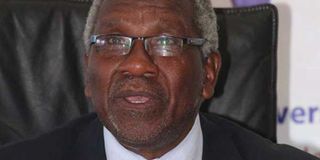CUE seeks to save cash-strapped varsities with radical plan

Chairman of Commission for University Education Chacha Nyaigoti Chacha. The commission will also require private universities to state their owners. PHOTO | FILE | NATION MEDIA GROUP
What you need to know:
- In 2016, only 6,318 out 12,096 government-sponsored students joined the private universities that they had been selected to join.
Most of the universities have since turned to certificate courses in order to fill available spaces after they failed to attract students.
Private universities will be required to provide annual financial statements to the regulator in a new proposal that seeks to bring order in the institutions that are facing financial and management crisis.
The proposal before the Commission for University Education (CUE) board for adoption will also require the private universities to state their owners so that in case of collapse, it is clear who takes responsibility.
The move is aimed at bringing financial and governance order in more than 37 private universities across the country, which have been facing several challenges.
CLOSURE
The universities were once considered models of better management compared to public institutions.
The institutions are also facing possible closure or retrenchment of staff due to lack of students.
This has been occasioned by the reduction of the number of students qualified to join universities in the last two years.
Most of the universities have since turned to certificate courses in order to fill available spaces after they failed to attract students.
The crisis persists despite the government having agreed to sponsor students in the private institutions.
According to data from the Kenya Universities and Colleges Central placement Service, private universities admitted 10,487 students this year compared to last year’s 17,368.
12,000
Public and private universities had invested heavily with the hope of getting private-sponsored students, but the heavy investment could now go to waste as the number of students to be admitted is low.
Both private and public universities had declared a capacity of 143,000, but it was revised to 93,000 by CUE after validation of degree programmes.
Last year, more than 5,000 government -sponsored students who were placed in private universities in September failed to take up their slots. Only 12,000 students took up their slots.
University Funding Board Chief Executive Milton Njuki said the board used Sh1.5 billion to place the students in the private universities.
In 2016, only 6,318 out 12,096 government-sponsored students joined the private universities that they had been selected to join.
The number of qualified students who attained C+ and above from 2017 KCSE examination was 69,151.
SHORT-TERM
But the Kenya Private Universities Association chairman Mumo Kisau said there is no cause for alarm as the institutions will navigate through the challenges they are facing.
Prof Kisau said universities that are facing challenges have been guided by CUE, and some of them are already implementing the recommendations made.
“Private universities will do their best. We are affected by lack of students and hope that the issue will be a short term crisis,” said Prof Kisau.
He also ruled out job cuts, saying the current staff will still need to serve third- and fourth-year students in the institutions.
CUE chairman Chacha Nyaigoti Chacha said there is need to re-look at licensing of private institutions as well as the setting up of university colleges.
LECTURERS' PAY
“Some of these institutions will still fail to attract students even in future. Students want institutions that are established and have necessary human resources,” said Prof Chacha.
But as Prof Kisau put on a brave face, Daystar University is the latest institution to be hit by financial crisis and poor management.
The institution has since been closed following protests by students over allegations of financial mismanagement.
Some universities have also been struggling to pay lectures, with some disappearing with students’ answer scripts in order to make the institutions to honour their obligations.
TRUSTEES
The issue of lack of qualified human resources has also been a challenge as some of the institutions have been unable to hire and retain the best lecturers.
“We have a problem in private universities, and also new universities that are coming up yet they cannot attract students,” said Prof Chacha.
“The challenge we are facing is that when awarding charters, there are various players listed such as trustees, council, church or individuals, but we do not get to identify the sponsor who is supposed to take responsibility when things do not work out,” he added.
However, some private universities are now blaming courses offered in those institutions for failing to attract students.
MANAGING
“Some of the courses that private universities offer are very specific and that is what many students do not like,” said a chairman of a private university.
Kenya Private Universities Workers Union secretary-general Peter Owiti said poor management is to blame for the woes affecting the institutions.
“There is need to separate running of church and managing a university. We also need the right people at the helm,” said Mr Owiti.





